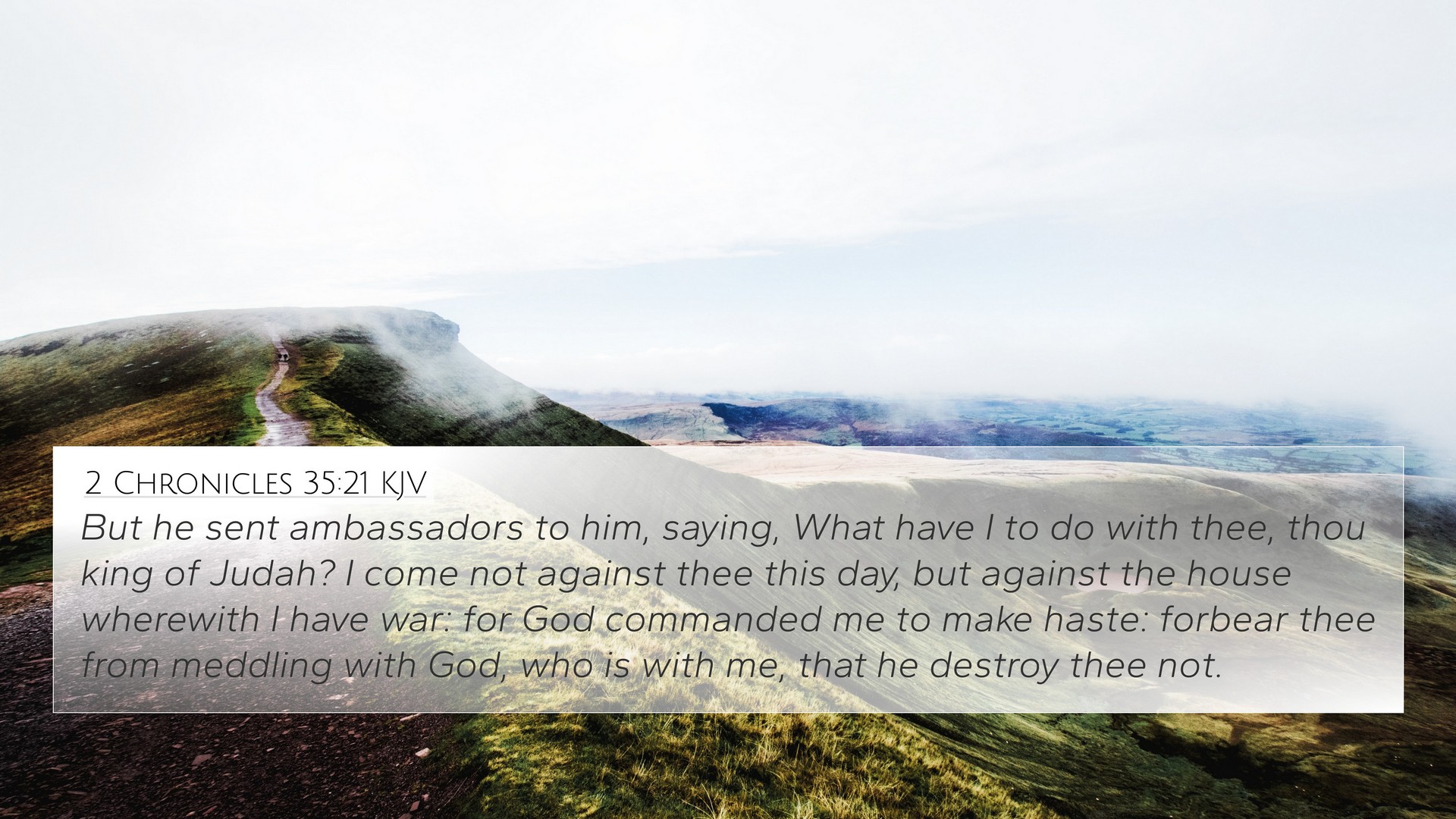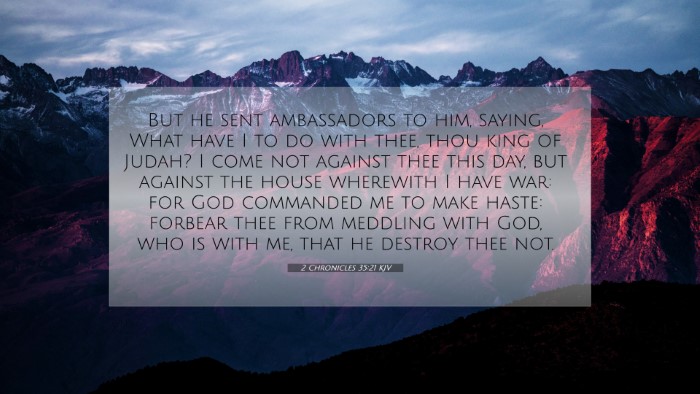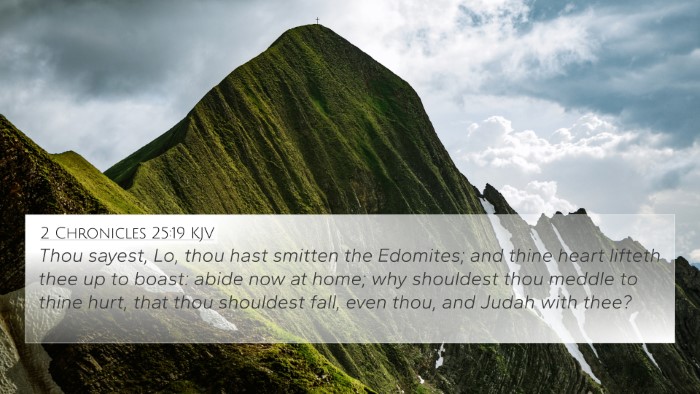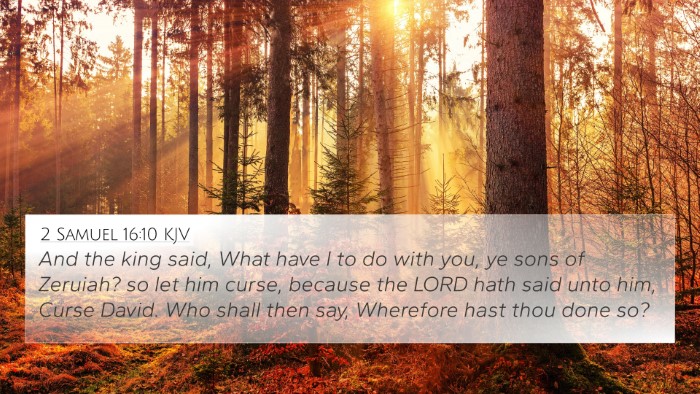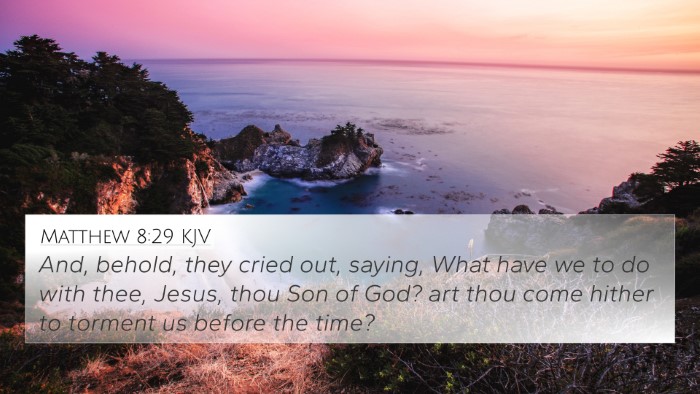Meaning and Interpretation of 2 Chronicles 35:21
The verse 2 Chronicles 35:21 states:
"But he sent messengers to him, saying, 'What have I to do with you, O King of Judah? I do not seek your battle today, but my war is against another house. And God commanded me to hurry. Stop opposing God, who is with me, lest He destroy you.'"
This powerful command illustrates the complexity and significance of divine interaction amidst human conflict. We shall explore the meanings and interpretations of this verse as understood in various public domain commentaries.
Summary of Insights
Albert Barnes Commentary
Albert Barnes suggests that King Josiah's intentions were righteous, but he overstepped his bounds by engaging in conflicts that were not his own. The messengers sent to him highlight how divine orchestration can involve direct communication from God, emphasizing the importance of recognizing one’s role in God’s plans.
Matthew Henry's Commentary
According to Matthew Henry, the message sent to Josiah serves as a sober reminder of the perils of pride and unwarranted aggression. Josiah’s willingness to battle may have stemmed from a desire for national strength, yet it was warned against by the king of Egypt. This reflects the idea that believers must discern God's will before acting, especially in times of conflict.
Adam Clarke's Commentary
Adam Clarke elaborates on the messengers' warning, implying that they recognized a higher authority in God’s command. Clarke points out that this illustrates the importance of humility before God and that battles should only be engaged when commanded by divine will. The prophet’s acknowledgment of God’s directive signifies a fundamental theme in the Bible—that human endeavors must align with God’s purposes.
Thematic Connections
This verse resonates with several key Biblical themes, primarily the tension between divine authority and human ambition. It serves as an intersection point for various other scriptures and narratives within the Biblical text.
Cross-References
- 1 Samuel 15:22-23 - Discusses the importance of obeying God's commands rather than human desires.
- 2 Kings 23:29-30 - Provides context to Josiah’s reign and his eventual fate in battle.
- Isaiah 30:1 - Warns against seeking rebellious paths instead of divine guidance.
- Proverbs 21:30 - Affirms that wisdom must rule over human strategies and conflicts.
- Jeremiah 42:3 - Highlights the need for guidance from God rather than self-directed actions.
- Acts 5:39 - A testament to recognizing God’s will in our pursuits, echoing a similar theme found in this verse.
- Romans 8:31 - Emphasizes God’s support for those aligned with His will, warning against opposing His purposes.
Practical Applications
In exploring 2 Chronicles 35:21, believers are reminded of the necessity of prayerful discernment before engaging in any spiritual or material battles. Here are some practical takeaways:
- Seek Divine Guidance: Before undertaking any significant action, ask for God's insight and clarity to ensure alignment with His will.
- Respect Authority: Acknowledge that God appoints leaders for His purposes and understand your role within His plans.
- Humility in Conflict: Recognize that not every battle is yours; discern whether the conflict lies within your God-given scope of influence.
Connecting Themes and Scriptures
This passage serves not only as a historical account but as a moral directive for contemporary believers. The connections between this scripture and others help form a narrative tapestry that underscores the necessity of faith and obedience in the face of life's conflicts.
Exploration of Related Themes
This verse can be cross-referenced with numerous others to create a thematic understanding of obedience, humility, and the recognition of divine authority:
- Faith in Times of Trial: Instances such as Matthew 6:33, underline the importance of seeking God's kingdom first.
- Recognizing God's Hand: James 4:7 reminds believers of the importance of submitting to God as a response to worldly conflicts.
- Importance of God's Word: Aligning actions with scripture as illustrated in Psalm 119:105, where God’s word is described as a lamp to guide our paths.
Conclusion
2 Chronicles 35:21 invites profound reflection on the nature of human decisions in contexts ordained by God. Through the exploration of associated scriptures, we establish cross-references that not only enhance our understanding of this particular verse but also enrich our grasp of Biblical themes as a whole.
In the light of the scripture's lessons, believers are encouraged to engage in a deeper exploration of the connections between Bible verses, utilizing tools like a Bible concordance or a cross-reference guide to illuminate their studies further.
Further Study Recommendations
- Participate in Bible cross-reference studies to enhance your understanding of scriptural connections.
- Utilize a Bible reference resource to navigate through thematic Bible verse connections.
- Investigate comparative studies of Pauline epistles for additional insights into New Testament teachings on obedience.
